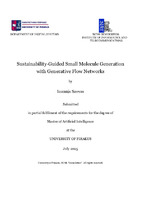Sustainability-guided small molecule generation with generative flow networks
Παραγωγή μικρών μορίων με βάση τη βιωσιμότητα μέσω γενετικών δικτύων ροής

Master Thesis
Author
Savvas, Ioannis
Σάββας, Ιωάννης
Date
2025-07View/
Keywords
Generative AI ; Generative flow networks ; Molecular discovery ; Property prediction ; Sustainable chemistry ; Environmental pollutionAbstract
Generative Artificial Intelligence (AI) has emerged as a promising tool for accelerating scientific discovery in chemistry, particularly in the field of molecular design. In response to the environmental pollution crisis, generative models can be leveraged to
propose environmentally friendly candidate molecules, thereby accelerating the design process and minimizing harmful effects on the environment. To that end, we investigate the use of Generative Flow Networks (GFNs), a family of generative models that
allow sampling combinatorial objects, such as molecules, by optimizing a property of interest. This is done by learning to sample proportionally to an externally defined reward function, which is typically a model (e.g. a neural net) functioning as a proxy to
the aforementioned property. In this thesis, we design and train GFlowNets to propose new molecules with low water solubility, a crucial physicochemical property of molecules that is linked to environmental leaching and pollution. Experimentally, we
evaluate the capacity of GFNs to simulate the desired distribution (via a battery of metrics), assessing their performance across various training objectives. Finally, we further screen the generated environmentally friendly molecules to identify potential
agrochemicals, such as pesticides, herbicides, and insecticides. The code is available at https://github.com/johnsaveus/gflownet.


